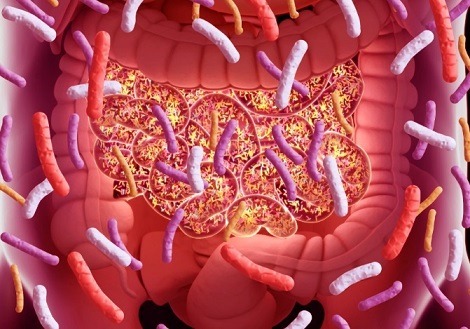Nikhil Prasad Fact checked by:Thailand Medical News Team Apr 01, 2025 3 weeks, 2 days, 14 hours, 4 minutes ago
Medical News: Researchers from The Warren Alpert Medical School of Brown University and Boston University have uncovered mounting evidence pointing to a hidden culprit behind persistent skin problems in long COVID sufferers: gut dysbiosis. The new study, recently published in the peer-reviewed journal COVID, sheds light on the gut–skin axis and how disturbances in gut bacteria caused by COVID-19 could be triggering or aggravating chronic skin issues like eczema, acne, rosacea, and even psoriasis.
 Post-COVID Gut Imbalance Could Be Causing Ongoing Skin Issues
Post-COVID Gut Imbalance Could Be Causing Ongoing Skin Issues
While most people associate COVID-19 with respiratory symptoms, its long-term effects stretch far beyond the lungs. In recent years, scientists have discovered that SARS-CoV-2, the virus behind COVID-19, disrupts the delicate ecosystem of bacteria in our intestines, a condition known as gut dysbiosis. This
Medical News report uncovers how that imbalance may set off a cascade of immune system reactions that reach all the way to the skin, causing inflammation, flare-ups, and other hard-to-treat dermatological symptoms that many long COVID patients continue to experience.
How COVID Wreaks Havoc on the Gut
The gut is a major hub of the immune system, and the virus exploits this by binding to ACE2 receptors found in abundance in the gut lining. This not only leads to damage of intestinal cells but also a dangerous shift in gut microbiota - lowering levels of beneficial bacteria such as Bifidobacterium and Faecalibacterium prausnitzii, while allowing harmful species like Enterococcus faecalis and E. coli to dominate.
The consequences include increased intestinal permeability or "leaky gut," where bacterial toxins escape into the bloodstream, triggering systemic inflammation. The immune system goes into overdrive, and some of this inflammatory firestorm shows up on the skin.
The Gut Skin Axis Explained
Our intestines and skin are more closely linked than they appear. When the gut barrier is compromised, toxins and pathogens leak out and activate the immune system, releasing pro-inflammatory cytokines like IL-6 and TNF-α. These molecules can travel through the blood and cause havoc in distant organs, including the skin.
Long COVID patients with disrupted gut flora show elevated levels of these inflammatory markers, which have long been associated with chronic skin conditions. This explains why individuals with persistent GI symptoms often also report worsening eczema, acne, rosacea, and even autoimmune-related disorders like psoriasis.
More Than Skin Deep - The Role of Immune Dysfunction
The study highlights how the depletion of key gut bacteria impairs the function of regulatory T-cells (Tregs), which are crucial for keeping the immune system in check. Without enough Tregs, inflammation runs rampant. Another factor is the reduction of short-chain fatty acids (SCFAs) like butyrate, which are byproducts of good bacteria and help maintain both gut and skin barrier integrity.
Furthermore
, certain post-COVID treatments such as antibiotics and corticosteroids may worsen this imbalance by killing off beneficial bacteria or promoting fungal overgrowth. This adds to the long-term complexity of the condition.
Common Skin Conditions Linked to Post-COVID Gut Dysbiosis
-
Eczema - Increased Th2-driven immune responses and loss of microbial diversity lead to more flare-ups.
-
Acne - Hormonal imbalance and elevated sebum production linked to microbial shifts.
-
Rosacea - Associated with small intestinal bacterial overgrowth (SIBO), worsened by gut dysbiosis.
-
Psoriasis - Triggered by systemic inflammation and leaky gut.
-
Hair Loss, Vitiligo, and Hives - Possibly tied to immune dysfunction and microbial triggers.
Potential Solutions Are on the Horizon
The authors emphasize that the situation isn’t hopeless. Microbiome-targeted therapies such as probiotics, prebiotics, and anti-inflammatory diets (like the Mediterranean diet) may help restore gut health and reduce skin symptoms. In more severe cases, fecal microbiota transplantation (FMT) could be a future option. Personalized treatment plans based on an individual’s microbiome may soon revolutionize how we treat long COVID skin complications.
Conclusion
The findings in this study underscore the need to look beyond traditional dermatological treatments when dealing with persistent skin conditions in long COVID patients. By acknowledging the central role of the gut and its microbial residents, clinicians may be able to unlock new pathways for healing. Tackling gut dysbiosis could not only alleviate skin issues but also improve systemic inflammation and overall long COVID outcomes. The gut skin axis offers a promising yet underexplored frontier in the fight against post-COVID syndromes.
The study findings were published in the peer reviewed journal: COVID
https://www.mdpi.com/2673-8112/5/4/48
For the latest COVID-19 News, keep on logging to Thailand
Medical News.
Read Also:
https://www.thailandmedical.news/news/gut-dysbiosis-and-chronic-inflammation-in-long-covid
https://www.thailandmedical.news/news/microbiota-dysbiosis-and-serotonin-dysregulation-linked-to-long-covid-gastrointestinal-symptoms
https://www.thailandmedical.news/news/sars-cov-2-induced-gut-dysbiosis-possibly-behind-growing-cases-of-post-covid-insomnia
https://www.thailandmedical.news/articles/coronavirus
https://www.thailandmedical.news/pages/thailand_doctors_listings
Follow us on:
https://x.com/ThailandMedicaX
https://www.facebook.com/ThailandMedicalNews
https://bsky.app/profile/thailandmedical.bsky.social
https://gettr.com/user/thailandmedicalnews
https://www.tribel.com/thailandmedical/wall
and 33 other social media platforms
